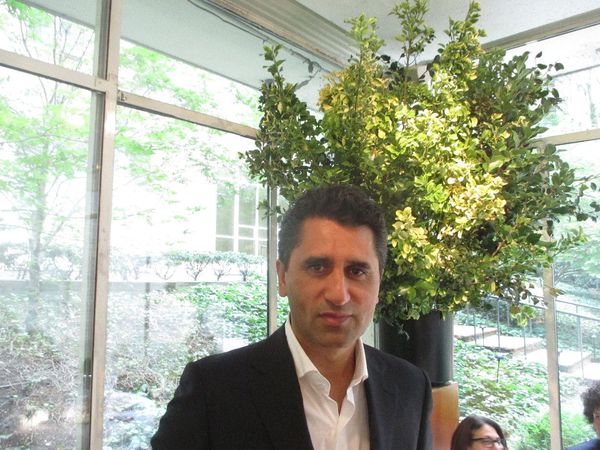 |
| The Dark Horse star Cliff Curtis on Genesis Potini: "He is like a work of art, really." Photo: Anne-Katrin Titze |
At the Broad Green Pictures luncheon, organised by Peggy Siegal for the star of James Napier Robertson's The Dark Horse, I was seated next to Cliff Curtis, who physically looks nothing like the man he portrays. Curtis was first seen on the big screen in Jane Campion's The Piano and worked with David O. Russell on Three Kings and on Niki Caro's Whale Rider, opposite Academy Award nominee for Best Actress, Keisha Castle-Hughes.
In The Dark Horse, a large figure, wrapped in a colorful patchwork blanket, walks in the pouring summer rain in the middle of a small-town street somewhere in New Zealand. Drawn as if by magical forces into a shop displaying a chessboard, the obviously disturbed man sees a flyer on the wall, advertising something called The Eastern Knights.
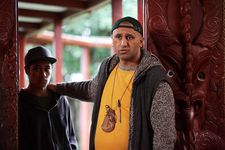 |
| Cliff Curtis as Genesis Potini: "People were transformed by their experience with him, by his sheer love." |
The Dark Horse is based on the real-life story of Genesis Potini, a genius and genial chess player who suffered from bipolar disorder and was hospitalised for many years. This extraordinary man's impact on the lives he touched is subject of the drama that looks both at the darkness and the light.
Over grilled fresh vegetables and heirloom tomatoes with mozzarella, Cliff Curtis and I chatted about fruit trees and gardening, about his discoveries while making a chess film that isn't about chess at all, redemption, inspiration, the man he portrays with great care, and why often the most rewarding roles are those where failure is an option.
Anne-Katrin Titze: Here we are in the middle of Manhattan talking about the fruit trees and berries you have where you live in New Zealand.
Cliff Curtis: I grew up in a house where when you wanted to heat the house, you'd go outside, chop the firewood that would heat the house, heat the water and you would cook on that fire. So when it gets cold, you'd just put on more clothes. I haven't had a television in 25 years. I just got one for my office.
AKT: How did you get involved with this film, The Dark Horse?
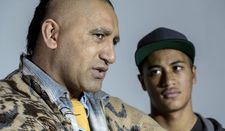 |
| Genesis wrapped in tiger blanket with his nephew Mana (James Rolleston): "The blanket has this wonderful softness. Almost biblical, a biblical sense of robes." |
CC: The normal way. I heard about this story of this 350 pound, homeless, toothless, bipolar chess player champion.
AKT: And you thought, "that's me?"
CC: No, I didn't. I thought, I don't play chess. Why would they want to talk to me? I didn't understand what it was. And it kept coming around and I still couldn't see me in that role. I thought this is a poor casting decision. The only reason they are talking to me is because I work in Hollywood movies. This is not for me. Find that person and cast him. If you get that casting wrong, you don't have a movie. And they took my advice and they searched and they searched and they came back again. And I said "Look, I'm a middle-aged man, I don't want to put on all that weight."
AKT: And shave your head…
CC: Pull out my teeth. All that kind of thing. It seemed very stressful to me. But then I saw a documentary about him [Genesis Potini] and I saw how extraordinary he was and it was completely intimidating. And I thought, I have no idea how I'm going to do it, how I could achieve that role, what the process would be. And then I knew I wanted to do it.
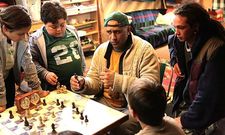 |
| The Dark Horse teaches the Eastern Knights: "He's the machine, the heart of the movie and they are like the secret sources." |
When it became so far beyond my scope, that creatively, artistically, this would be probably the most difficult thing I've ever done, then it became interesting. And then I had to make a deal with the director [Robertson]. I said, "look, if you can accept that I have no idea how to approach the role and I have no idea what the outcome would be." And it has to be under the condition that failure is clearly an option. We have to be willing to fail.
AKT: That is the most interesting work in general. Arnaud Desplechin told me just a few days ago, that what interests him is what his actors "cannot do."
CC: Yeah. I had one morsel of hope that made me think. I never met the man but I talked to a lot of people. What I understood that was crucial to understanding the role and to the point of making the movie. A very simple and elegant idea - it was the immense love that this man had for life and for people. And he moved people. He had an extraordinary ability. People were transformed by their experience with him, by his sheer love.
I had to be really clear that the idea of the physicality or his mental health or his toothlessness or his homelessness were relatively superficial aspects to what we were hoping to achieve. We did do all of that. I was like, I'm going to shave my head and pull out my teeth, I'm going to wear a blanket, I'll walk around like a clown with pink shoes for three months. I did all of that but I didn't understand what it was and his mental state of mind. What transformed people was none of that. The connective was his love of the game, of life. Sure, it was driven by hyper-mania.
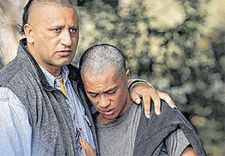 |
| Genesis with Mana: "The gangs were very divisive." |
The trials he went through in his mental illness - he spent years and years incarcerated, locked up and tranquilised. He lived under a bridge. Jesus went to the desert for 40 days and 40 nights - this guy lived a life where he overcame the greatest suffering in life and depression, off and on medication. He was diagnosed very young. He was obviously a very gifted mathematician and chess genius. He was a prodigy but he was broken. He was a broken genius. What survived was his ability to love. If you don't have love in this movie, the movie's nothing.
AKT: What I noticed was in the remarkable scenes when he is talking to himself, you show his self respect. He is struggling with it, but love has to come for his own situation as well.
CC: Exactly. We all are people who are hurt by their life. We all carry those wounds. We all do. We all are wounded by our experiences. Loss of love, loss of possibility, loss of hope. What's remarkable about human beings, the ones that should, by all means, be broken, unable to stand up again and they rise out of this with love. He is like a work of art, really. He didn't see your physical being. He connected with you purely from a heart's space. He had a deep self-awareness and understanding of his situation.
AKT: The film also shows, a fact I liked, that sometimes the love doesn't work. When he sets up the chessboard on the car in the hostile neighborhood. He is being beaten up.
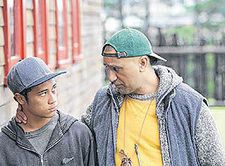 |
| Mana with Genesis: "We all are wounded by our experiences." |
CC: He is rejected, yes.
AKT: What surprised me was that I liked his style. From the Irish cardigan to the capes.
CC: He had a great sense of style. There's one blanket in there, that's actually his real blanket.
AKT: Which one is that?
CC: The one with the tiger stripes on it. It was a beige and brown thing and I wore that every day. It was gifted to me by his wife on the first day of the shoot.
AKT: Was that the only object of his? The chess pieces were not his?
CC: No, that was the only object. The blanket has this wonderful softness. Almost biblical, a biblical sense of robes. It's difficult to play chess with them. He was like a magician.
AKT: How did you bond with the children?
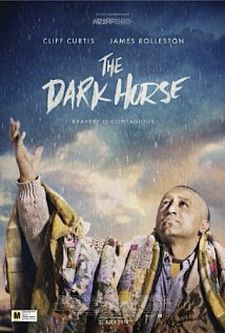 |
| The Dark Horse US poster |
CC: They're the secret source. He's the machine, the heart of the movie and they are like the secret sources. They engage your heart immediately. It's a cleverly constructed film because we start with him as a child.
AKT: And then there are these tough gangs.
CC: The gangs were very divisive. You need a very clear threat for the young boy's life and it had to be tangible and viscerally real. They were also a real part of his life. His older brother did really live among the gangs… The masquerade of masculinity, [Genesis] sees right through it. He was a powerful man entirely capable of enacting violence. But it was pointless. If he had hit this gang member, in his mind, he would have been hitting a child.
AKT: That doubles with the chess scene when he says to the kids, "don't be nervous, they are all scared."
CC: At the chess championship with supposedly privileged white children, he says "we're all the same." To me the film is a love letter to these people and their communities that find a vocation in helping others. And they have little themselves. The people that have the least continue to give the most.
AKT: The Dark Horse is one of those chess films that is very little about chess.
CC: That's true. It's really not about chess and it's really not about mental illness. And it's not about gangs. It's a really tricky film to market. It's really about redemption, inspiration. No guns, no zombies in sight.
The Dark Horse opens in the US on December 11 and is available on DVD in the UK.





















